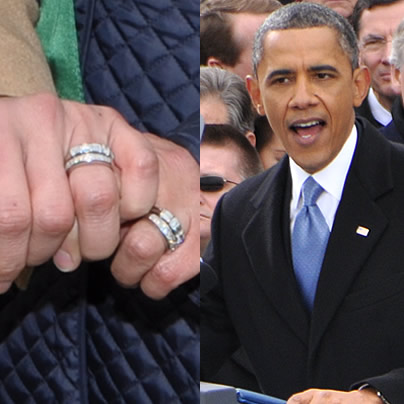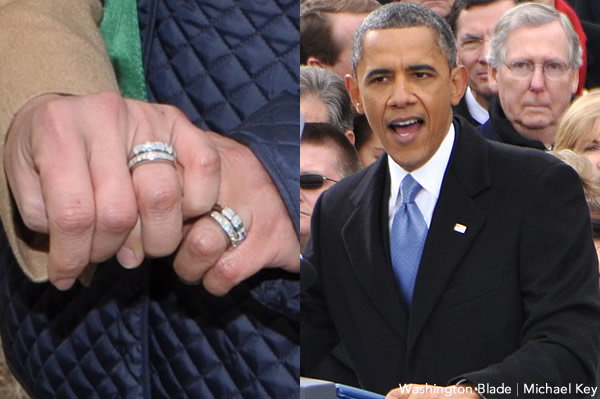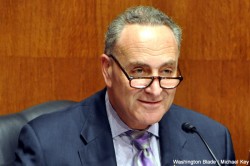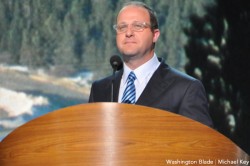National
Will Obama include gay couples in immigration reform?
White House sounds amenable, but divided Congress an obstacle


(Washington Blade photos by Michael Key)
There are signs that President Obama will include relief for bi-national same-sex couples as part of his proposals for comprehensive immigration reform, but whether the Senate will agree to such language as part of bipartisan compromise legislation remains an open question.
Shin Inouye, a White House spokesperson, declined to preview whether Obama will include a provision for bi-national same-sex couples as part of his highly anticipated proposal for immigration reform, but maintained the president is committed to bi-national same-sex couples.
“The president has made it clear on a number of occasions that comprehensive immigration reform is a key priority, including in major speeches over the last four years,” Inouye said. “While I’m not going to preview the president’s proposal, he has long believed that Americans with same-sex partners from other countries should not be faced with the painful choice between staying with the person they love or staying in the country they love, and he welcomes changes that would help keep families together.”
Although not a commitment, that response is the strongest on-the-record statement yet from a White House official on Obama’s support for bi-national couples and whether he’ll seek language to include them as part of his immigration reform plan.
Unlike straight Americans in opposite-sex marriages, gay Americans are unable to sponsor their foreign partners for residency in the United States because they can’t marry in most states and in states where they can, the Obama administration continues to deny marriage-based green card applications because of the Defense of Marriage Act.
Current law could lead to separation for many bi-national same-sex couples — and in some extreme cases deportation of the foreign national in the relationship if they lose their immigration status. Standalone legislation that would address this issue is known as the Uniting American Families Act.
According to a November 2011 report from the Williams Institute, there are an estimated 28,500 bi-national same-sex couples and nearly 11,500 same-sex couples in which neither partner is a U.S. citizen — making for a total of 40,000 couples that are ineligible to take advantage of immigration preferences available to different-sex spouses.
LGBT advocates have been calling on the Obama administration and Congress to address the issue as part of comprehensive immigration reform. While such legislation didn’t move during the first four years of the administration, Obama has pledged to take the lead on reform at the start of his second term.
Obama emphasized that he would pursue comprehensive immigration reform last month during an interview on NBC’s “Meet the Press,” saying, “I’ve said that fixing our broken immigration system is a top priority. I will introduce legislation in the first year to get that done.”
According to a report in the New York Times earlier this month, Obama plans to push Congress to enact a massive overhaul of the immigration system — a large proposal as opposed to a series of separate bills — that would include a path to citizenship for most of the 11 million undocumented immigrants in the country. Additionally, it would set up a nationwide verification system of legal status for all newly hired workers; add visas to relieve backlogs and allow skilled immigrants to stay in the country; and create a guest-worker program to attract low-wage immigrants in the future.
That proposal could be made public in the coming weeks. The Times reported that Obama may elect to lay out his plan in the upcoming State of the Union address. U.S. House Speaker John Boehner (R-Ohio) invited Obama to deliver the address before a joint session of Congress on Feb. 12.
LGBT advocates, including some who spoke to the Washington Blade on condition of anonymity, said they fully expect Obama to include language for bi-national same-sex couples as part of his plan for immigration overhaul. One anonymous advocate said the Obama administration has given them “positive feedback” on an LGBT-inclusive proposal.
Steve Ralls, a spokesperson for Immigration Equality, was among those expressing confidence that Obama would choose to include UAFA in any immigration package that he would propose to Congress.
“Immigration Equality has been very encouraged by our ongoing conversations with the administration,” Ralls said. “We believe the president and his team will help craft and pass a bill that keeps families, gay and straight, together. We are looking forward to the president outlining his vision for reform in the coming weeks, and we take him at his word that keeping LGBT families together is a goal we all share.”
Calls on Obama to address this issue in his immigration plan are concurrent with calls on him to take administrative action. LGBT rights supporters — most recently Sen. Kirsten Gillibrand, who a led a group of 13 senators in a letter to the administration — are asking the Department of Homeland Security to hold in abeyance marriage-based green card applications for bi-national couples as a temporary solution to ensure they won’t be separated. The Obama administration has responded by saying it must continue to enforce DOMA and continues to deny these applications.
Still, the Obama administration has taken steps to address this issue, but nothing has been codified into law. In October, the Department of Homeland Security issued guidance stipulating immigration officers should consider “long-term, same-sex partners” as families when considering whether to exercise prosecutorial discretion in the potential deportation of an undocumented immigrant.
Will Senate agree to UAFA-inclusive package?
But while signs indicate that Obama will ask Congress to pass a UAFA-inclusive immigration reform bill, questions linger over whether the Senate will come to an agreement to pass an immigration package that would protect LGBT families.
Concurrent with the plan the White House is developing, a bipartisan group of senators has engaged in talks to craft a comprehensive bill that, according to the Times, could be introduced as early as March with the plan to hold a floor vote before August. Legislation is expected to start in the Democratic-controlled Senate before moving over the Republican-controlled House for final passage.
Sen. Chuck Schumer (D-N.Y.), who has championed the legislation in the past, is the lead Democrat involved with the talks, while Sen. Lindsey Graham (R-S.C.) is the lead Republican. Others reportedly involved in the talks are Sens. Michael Bennet (D-Colo.), Bob Menendez (D-N.J.) and Richard Durbin (D-Ill.) on the Democratic side and Sens. John McCain (R-Ariz.), Marco Rubio (R-Fla.) and Mike Lee (R-Utah) on the Republican side.

Sen. Chuck Schumer (D-N.Y.) (Washington Blade file photo by Michael Key)
Many Capitol Hill sources said it’s simply too early in the process to determine whether the agreement in the Senate would include UAFA. But one anonymous LGBT advocate said he doesn’t expect the Senate to come up with a proposal that includes UAFA because whatever agreement is concocted must meet the approval of the Republicans involved in the talks, and they won’t be keen on agreeing to explicit LGBT provisions.
In the Human Rights Campaign’s most recent scorecard for the 112th Congress, Republicans involved in the discussions didn’t have strong scores. Lee scored 40, Rubio scored 47 while both McCain and Graham earned low scores of 15. None of the offices of the senators involved in the talks — Democratic or Republican — responded to the Washington Blade’s request for comment on including UAFA in their agreement.
That doesn’t even take into account the chances of passing an LGBT-inclusive bill in the House. Last year, the Senate was able to pass an LGBT-inclusive reauthorization of the Violence Against Women Act, but the version the House passed lacked such language.

Rep. Jared Polis (D-Colo.) says immigration reform will be ‘very difficult to pass.’ (Washington Blade photo by Michael Key)
Gay Rep. Jared Polis (D-Colo.), who’s also been a leading advocate of immigration reform, remains skeptical about the prospects for passing immigration reform this Congress — with or without inclusion of UAFA.
“Immigration reform is going to be very difficult to pass,” Polis said. “The consideration of LGBT families is one of the less controversial aspects. The most controversial aspect is the treatment of the 10 to 15 million people who are already here illegally. So, it’s going to be difficult to get it through. If there is a vehicle to pass immigration reform, I’m going to work hard and I know that Sen. Schumer is also committed to immigration equality for gay and lesbian families.”
Immigration Equality’s Ralls said he’s “increasingly optimistic” that senators would agree to a proposal that would include a provision for bi-national couples — particularly if Obama exercises leadership by including such language in his proposal to Congress.
And in a video report produced by Raw Story earlier this month, a Schumer staffer told a dozen same-sex couples and activists who came to his New York City office that the senator believes UAFA should be part of comprehensive immigration reform. The staffer was later identified as Nick Martin, Schumer’s director of intergovernmental relations.
“He is a co-sponsor of UAFA,” the staffer said. “It is part of his vision for what the comprehensive immigration bill will — it will be included in that. I don’t think the issue is — we’ve quite gotten to that issue yet. We’re really focused right now in terms of a path to citizenship. But it is a key issue for him to get to that as part of that process.”
An earlier version of comprehensive immigration reform introduced by Menendez in the 111th and 112th Congress included UAFA-like language, but that legislation had only Democratic co-sponsors and saw no movement.
In any event, members of Congress still plan on moving forward with standalone legislation that would enable gay Americans to sponsor their foreign partners for residency in the United States. In the past, the bill has been introduced by Rep. Jerrold Nadler (D-N.Y.) in the House and Senate Judiciary Chair Patrick Leahy (D-Vt.) in the Senate.
“Fairness in our immigration laws for all Americans and their loved ones is of the utmost importance, and in pursuit of that, I look forward to again introducing the Uniting American Families Act early this year,” Leahy said in a statement to the Blade. “I was proud to have a bipartisan bill in the last Congress, and I look forward to working with members from both parties on this issue this year.”
Another key question is whether a provision for bi-national couples is even necessary as part of comprehensive immigration reform if DOMA is struck down by the Supreme Court before the end of June. Justices are weighing a challenge to the anti-gay statute known as Windsor v. United States.
That decision could remove a major barrier for bi-national same-sex couples. Without DOMA, the administration would no longer have an excuse for denying marriage-based green card applications for same-sex couples. Gay Americans who are married to foreign same-sex partners would logically be able to sponsor their partners for residency in the United States.
The sentiment that UAFA will be unnecessary if the court strikes down DOMA was held by Polis, who said the court would be the source of relief for bi-national couples, not legislation.
“Keep in mind one thing, there’s also the pending Supreme Court case, where if DOMA is invalidated, there will not need to be special consideration in the law,” Polis said. “Gay and lesbian marriages would simply be allowed for immigration purposes. So, that’s also happening concurrent with this debate about immigration reform.”
But Ralls said UAFA-inclusive immigration reform is still necessary. First, he noted the court is unpredictable and there’s no guarantee that justices will deliver a ruling in a few months that will be favorable to bi-national couples.
“UAFA in immigration reform is a critical safety net for all couples, should the court not rule favorably,” Ralls said. “Until there is a Supreme Court ruling striking down DOMA once and for all, we are committed to pursuing every possible avenue — in Congress and administratively — to protect the families we represent.”
Further, Ralls said striking down DOMA would not have an impact on all same-sex bi-national couples, such as couples where one spouse is a recent asylee.
Straight asylum seekers who leave a spouse behind in the country of persecution can immediately file to bring a spouse to the United States after winning asylum here. But countries that persecute gays aren’t likely to have marriage equality laws, so the gay asylee would not have been able to marry a partner before fleeing. Even without DOMA, such a gay asylee would have to naturalize — which would take more than five years after arriving in the United States — before that person could sponsor a partner on a visa.
“Of course, the end of DOMA would be a terrific solution for bi-national couples, but until we have that ruling in hand, we are committed to pursuing other options — like inclusive immigration reform — which will give all couples access to a green card,” Ralls concluded.
U.S. Supreme Court
Supreme Court to consider bans on trans athletes in school sports
27 states have passed laws limiting participation in athletics programs

The U.S. Supreme Court on Thursday agreed to hear two cases involving transgender youth challenging bans prohibiting them from participating in school sports.
In Little v. Hecox, plaintiffs represented by the ACLU, Legal Voice, and the law firm Cooley are challenging Idaho’s 2020 ban, which requires sex testing to adjudicate questions of an athlete’s eligibility.
The 9th U.S. Circuit Court of Appeals described the process in a 2023 decision halting the policy’s enforcement pending an outcome in the litigation. The “sex dispute verification process, whereby any individual can ‘dispute’ the sex of any female student athlete in the state of Idaho,” the court wrote, would “require her to undergo intrusive medical procedures to verify her sex, including gynecological exams.”
In West Virginia v. B.P.J., Lambda Legal, the ACLU, the ACLU of West Virginia, and Cooley are representing a trans middle school student challenging the Mountain State’s 2021 ban on trans athletes.
The plaintiff was participating in cross country when the law was passed, taking puberty blockers that would have significantly reduced the chances that she could have a physiological advantage over cisgender peers.
“Like any other educational program, school athletic programs should be accessible for everyone regardless of their sex or transgender status,” said Joshua Block, senior counsel for the ACLU’s LGBTQ and HIV Project. “Trans kids play sports for the same reasons their peers do — to learn perseverance, dedication, teamwork, and to simply have fun with their friends,” Block said.
He added, “Categorically excluding kids from school sports just because they are transgender will only make our schools less safe and more hurtful places for all youth. We believe the lower courts were right to block these discriminatory laws, and we will continue to defend the freedom of all kids to play.”
“Our client just wants to play sports with her friends and peers,” said Lambda Legal Senior Counsel Tara Borelli. “Everyone understands the value of participating in team athletics, for fitness, leadership, socialization, and myriad other benefits.”
Borelli continued, “The U.S. Court of Appeals for the Fourth Circuit last April issued a thoughtful and thorough ruling allowing B.P.J. to continue participating in track events. That well-reasoned decision should stand the test of time, and we stand ready to defend it.”
Shortly after taking control of both legislative chambers, Republican members of Congress tried — unsuccessfully — to pass a national ban like those now enforced in 27 states since 2020.
Federal Government
UPenn erases Lia Thomas’s records as part of settlement with White House
University agreed to ban trans women from women’s sports teams

In a settlement with the Trump-Vance administration announced on Tuesday, the University of Pennsylvania will ban transgender athletes from competing and erase swimming records set by transgender former student Lia Thomas.
The U.S. Department of Education’s Office for Civil Rights found the university in violation of Title IX, the federal rights law barring sex based discrimination in educational institutions, by “permitting males to compete in women’s intercollegiate athletics and to occupy women-only intimate facilities.”
The statement issued by University of Pennsylvania President J. Larry Jameson highlighted how the law’s interpretation was changed substantially under President Donald Trump’s second term.
“The Department of Education OCR investigated the participation of one transgender athlete on the women’s swimming team three years ago, during the 2021-2022 swim season,” he wrote. “At that time, Penn was in compliance with NCAA eligibility rules and Title IX as then interpreted.”
Jameson continued, “Penn has always followed — and continues to follow — Title IX and the applicable policy of the NCAA regarding transgender athletes. NCAA eligibility rules changed in February 2025 with Executive Orders 14168 and 14201 and Penn will continue to adhere to these new rules.”
Writing that “we acknowledge that some student-athletes were disadvantaged by these rules” in place while Thomas was allowed to compete, the university president added, “We recognize this and will apologize to those who experienced a competitive disadvantage or experienced anxiety because of the policies in effect at the time.”
“Today’s resolution agreement with UPenn is yet another example of the Trump effect in action,” Education Secretary Linda McMahon said in a statement. “Thanks to the leadership of President Trump, UPenn has agreed both to apologize for its past Title IX violations and to ensure that women’s sports are protected at the university for future generations of female athletes.”
Under former President Joe Biden, the department’s Office of Civil Rights sought to protect against anti-LGBTQ discrimination in education, bringing investigations and enforcement actions in cases where school officials might, for example, require trans students to use restrooms and facilities consistent with their birth sex or fail to respond to peer harassment over their gender identity.
Much of the legal reasoning behind the Biden-Harris administration’s positions extended from the 2020 U.S. Supreme Court case Bostock v. Clayton County, which found that sex-based discrimination includes that which is based on sexual orientation or gender identity under Title VII rules covering employment practices.
The Trump-Vance administration last week put the state of California on notice that its trans athlete policies were, or once were, in violation of Title IX, which comes amid the ongoing battle with Maine over the same issue.
New York
Two teens shot steps from Stonewall Inn after NYC Pride parade
One of the victims remains in critical condition

On Sunday night, following the annual NYC Pride March, two girls were shot in Sheridan Square, feet away from the historic Stonewall Inn.
According to an NYPD report, the two girls, aged 16 and 17, were shot around 10:15 p.m. as Pride festivities began to wind down. The 16-year-old was struck in the head and, according to police sources, is said to be in critical condition, while the 17-year-old was said to be in stable condition.
The Washington Blade confirmed with the NYPD the details from the police reports and learned no arrests had been made as of noon Monday.
The shooting took place in the Greenwich Village neighborhood of Manhattan, mere feet away from the most famous gay bar in the city — if not the world — the Stonewall Inn. Earlier that day, hundreds of thousands of people marched down Christopher Street to celebrate 55 years of LGBTQ people standing up for their rights.
In June 1969, after police raided the Stonewall Inn, members of the LGBTQ community pushed back, sparking what became known as the Stonewall riots. Over the course of two days, LGBTQ New Yorkers protested the discriminatory policing of queer spaces across the city and mobilized to speak out — and throw bottles if need be — at officers attempting to suppress their existence.
The following year, LGBTQ people returned to the Stonewall Inn and marched through the same streets where queer New Yorkers had been arrested, marking the first “Gay Pride March” in history and declaring that LGBTQ people were not going anywhere.
New York State Assemblywoman Deborah Glick, whose district includes Greenwich Village, took to social media to comment on the shooting.
“After decades of peaceful Pride celebrations — this year gun fire and two people shot near the Stonewall Inn is a reminder that gun violence is everywhere,” the lesbian lawmaker said on X. “Guns are a problem despite the NRA BS.”
-

 U.S. Supreme Court3 days ago
U.S. Supreme Court3 days agoSupreme Court to consider bans on trans athletes in school sports
-

 Out & About3 days ago
Out & About3 days agoCelebrate the Fourth of July the gay way!
-

 Virginia3 days ago
Virginia3 days agoVa. court allows conversion therapy despite law banning it
-

 Maryland5 days ago
Maryland5 days agoLGBTQ suicide prevention hotline option is going away. Here’s where else to go in Md.












